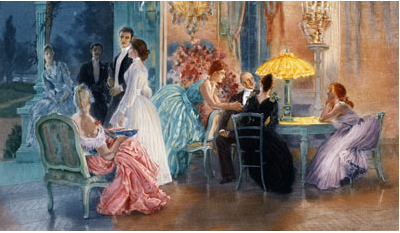
SIR ISAIAH BERLIN, a Latvian-born Oxford philosopher who died in 1997, may well have ranked among the greatest conversationalists who ever lived. According to Robert Darnton, a Princeton historian, Berlin's friends would "watch him as if he were a trapeze artist, soaring through every imaginable subject, spinning, flipping, hanging by his heels and without a touch of showmanship". Darnton reckoned that Berlin's only match in relatively modern times might have been Denis Diderot, an 18th-century French Enlightenment philosopher. By one account Diderot's conversation was "enlivened by absolute sincerity, subtle without obscurity, varied in its forms, dazzling in its flights of imagination, fertile in ideas and in its capacity to inspire ideas in others. One let oneself drift along with it for hours at a time, as if one were gliding down a fresh and limpid river, whose banks were adorned with rich estates and beautiful houses."
出生于拉脱维亚,辞世于1997年的牛津哲学家ISAIAH BERLIN爵士足可跻身于世间曾有的最伟大的健谈人士之列。据普林斯顿大学历史学家Robert Darnton称,Berlin的朋友们会"注视着他就像看着一位高空杂技艺术家——他从你想象得到的每一个道具中猛然穿越而过,靠一双脚跟旋转着,弹跳着,悬挂着,而你却对他表演能力毫无察觉"。 Darnton认为,在相对当代时间内,唯一可以与Berlin媲美的是18世纪的法国启蒙哲学家狄德罗(Denis Diderot)。据说,狄德罗的谈吐的特点是"因极致的真诚而来的生动活泼,机巧而不含糊,形式多有变化,想象力奇妙得令人惊羡,观点丰富,其内涵足以激发他人的观点。他的谈吐,能让人一次随之游荡上数个小时,仿佛随着清澈而明净的河水飘摇而下,两岸河边点缀着富气的洋房和美丽的宅院。"
Churchill was another magnificent talker, perhaps the greatest of the 20th century, but often a poor listener. Virginia Woolf was given, in the words of one biographer, to "wonderful performances in conversation, spinning off into fantastic fabrications while everyone sat around and, as it were, applauded". A short list of the greatest living conversationalists in English would probably have to include Christopher Hitchens, Sir Patrick Leigh Fermor, Sir Tom Stoppard, Studs Terkel and Gore Vidal.
丘吉尔(Churchill)是另一位豪气干云的健谈家,他也许还是20世纪最伟大的健谈家,但他常常是个糟糕的倾听者。在一本传记中,弗吉尼亚·伍尔芙(Virginia Woolf)被写描写成:"交谈时的表现非凡,在仿佛受人称道似的被大家围坐一旁时,他说起来了就像是穿针引线,织布成锦。"如果拉出一个尚且健存在世的最伟大的英语健谈家的简短名单话,大概一定要囊括上Christopher Hitchens,Patrick Leigh Fermor爵士, Tom Stoppard爵士, Studs Terkel和Gore Vidal这几位了。
Great brilliance, fantastic powers of recall and quick wit are clearly valuable in sustaining conversation at these cosmic levels. Charm may be helpful too—although Samuel Johnson, one of the most admired conversationalists of 18th-century England, seemed to manage without much of it. For those of more modest accomplishments, but attached to conversation as one of life's pleasures and necessary skills, there is a lively market in manuals and tip-sheets going back almost 500 years, and a legacy of wisdom with an even longer history. One striking thing about the advice is how consistent it remains over time, suggesting that there are real rights and wrongs in conversation, not just local conventions.
在这些普适用水平上,横溢的才华、非凡出色的回忆能力和急智,这些都对支持谈吐都有明确的价值。魅力也能多少的增色添香——尽管18世纪英格兰最令人钦佩的交谈高手Samuel Johnson在这一点上并粘到多少光也能得心应手。对于那些更为适宜的教养,除了作为人一生的乐趣和必需技能而依附于谈吐之上,还有一个可以追溯至近500年前的、存在于手册和小窍门折页的鲜活的市场和一份甚至历史更悠久的智慧遗产。"超时的剩余部分有多大的一致性" 这样一个有关建议所突出的事宜,提示谈吐中确实有对有错,而不仅仅只是本土习俗。
The principle that it is rude to interrupt another speaker goes back at least to Cicero, writing in 44BC, who said that good conversation required "alternation" among participants. In his essay "On Duties", Cicero remarked that nobody, to his knowledge, had yet set down the rules for ordinary conversation, though many had done so for public speaking. He had a shot at it himself, and quickly arrived at the sort of list that self-help authors have been echoing ever since. The rules we learn from Cicero are these: speak clearly; speak easily but not too much, especially when others want their turn; do not interrupt; be courteous; deal seriously with serious matters and gracefully with lighter ones; never criticise people behind their backs; stick to subjects of general interest; do not talk about yourself; and, above all, never lose your temper.
"打断别的发言人的讲话是粗俗鲁莽的" 的这一原则这至少可以追溯至公元前44年,西塞罗(Cicero)所写的文字。他说,良好的交谈需要参与者之间的"轮转"。其著作《论责任》中,西塞罗谈论到,据他所知,已经有人为日常会话制定出了规则,尽管许多人作公共讲演时也施行这些规则。他自己据此而行,飞快跻身到了某种"自学的作品引起了从未有过的回应"的名单之上。从西塞罗这可以学到的这些规则有:咬字清楚,通情达意;谈吐自如,勿要赘言敷叙,他人出语之刻,殊不可间语插话;知书达礼持;大事慎应,小事雅裁;戒以蜚短流长、说项说庄;老调多弹,乡俗常拾;(坚持普罗大众的感兴趣的话题);勿要自是自彰,自矜自夸。诸般之上,万不可易色改容,失性发狂(而在所以这些之上的则是绝不发火发飙。)
Probably only two cardinal rules were lacking from Cicero's list: remember people's names, and be a good listener. Each of these pieces of advice also has a long pedigree. At a pinch you might trace the point about names back to Plato. Both found a persuasive modern advocate in Dale Carnegie, a teacher of public speaking who decided in 1936 that Americans needed educating more broadly in "the fine art of getting along". His book "How to Win Friends and Influence People" is still in print 70 years later and has sold 15m copies. To remember names, and to listen well, are two of Carnegie's "six ways to make people like you". The others are to become genuinely interested in other people; smile; talk in terms of the other person's interests; and make the other person feel important.
西塞罗的单子上也许只少了2个关键性的规则:记住人们的名字,成为好的倾听者。这些建议的吉光片羽都源远流长。寻幽探微的话,追溯起来可以找到柏拉图的名字。两者都在能言善道的时髦鼓吹手Dale Carnegie身上中找得到。作为教授公开演讲的老师,他在1936年断言,美国人需要进行更为宽泛的"相处的现代艺术"教育。其著作《如何赢得朋友和影响他人》在之后的70年里一直还在印刷出版,售卖了1500万本。记住姓名,进行良好的倾听,是Carnegie的"让别人喜欢上你的6个办法"中的2个。其他的几个是:发自内心的关注他人、微笑、用别人感兴趣的腔调说话、让他/她觉得自己很重要。
Cicero's rules of conversation seem to have been fairly common across cultures as well as time, if varying in strictness. It might reasonably be said that Italians are more tolerant of interruption, Americans of contradiction and the English of formality, for example. These rules of conversation also intersect with those of politeness more generally, as formulated by two American linguists, Penelope Brown and Steven Levinson, the pioneers of "politeness theory".
西塞罗的谈话原则在不同文化不同时代里都是适用的,只不过侧重点不一样(对各项原则的要求严格程度并不一样)。比如说,意大利人更能忍受被人打断,美国人忍受自相矛盾,英国人忍受拘谨俗套,这些都是合乎情理的。正如由作为"礼貌理论"的先锋的2位美国语言学家Penelope Brown和Steven Levinson所系统化表达的那样,这些规则更为普遍的与礼貌互相作用。













